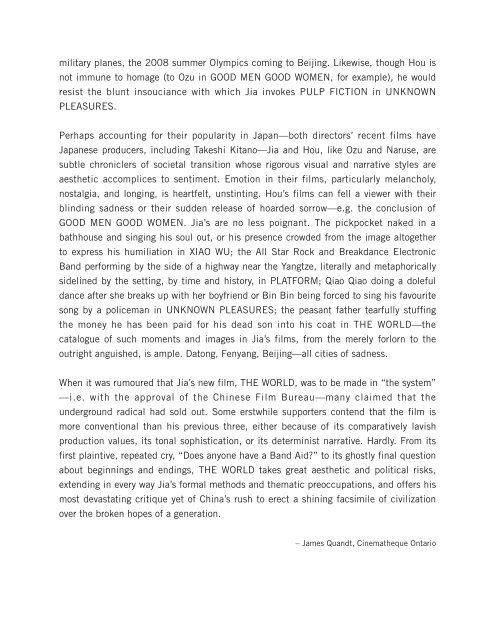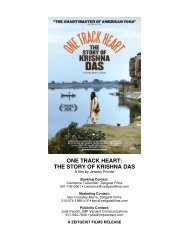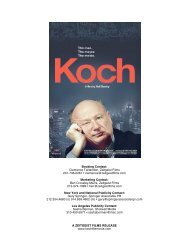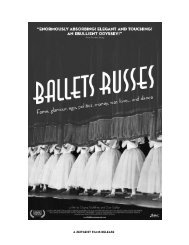You also want an ePaper? Increase the reach of your titles
YUMPU automatically turns print PDFs into web optimized ePapers that Google loves.
military planes, the 2008 summer Olympics coming to Beijing. Likewise, though Hou is<br />
not immune to homage (to Ozu in GOOD MEN GOOD WOMEN, for example), he would<br />
resist the blunt insouciance with which <strong>Jia</strong> invokes PULP FICTION in UNKNOWN<br />
PLEASURES.<br />
Perhaps accounting for their popularity in Japan—both directors’ recent films have<br />
Japanese producers, including Takeshi Kitano—<strong>Jia</strong> and Hou, like Ozu and Naruse, are<br />
subtle chroniclers of societal transition whose rigorous visual and narrative styles are<br />
aesthetic accomplices to sentiment. Emotion in their films, particularly melancholy,<br />
nostalgia, and longing, is heartfelt, unstinting. Hou’s films can fell a viewer with their<br />
blinding sadness or their sudden release of hoarded sorrow—e.g. the conclusion of<br />
GOOD MEN GOOD WOMEN. <strong>Jia</strong>’s are no less poignant. The pickpocket naked in a<br />
bathhouse and singing his soul out, or his presence crowded from the image altogether<br />
to express his humiliation in XIAO WU; the All Star Rock and Breakdance Electronic<br />
Band performing by the side of a highway near the Yangtze, literally and metaphorically<br />
sidelined by the setting, by time and history, in PLATFORM; Qiao Qiao doing a doleful<br />
dance after she breaks up with her boyfriend or Bin Bin being forced to sing his favourite<br />
song by a policeman in UNKNOWN PLEASURES; the peasant father tearfully stuffing<br />
the money he has been paid for his dead son into his coat in THE WORLD—the<br />
catalogue of such moments and images in <strong>Jia</strong>’s films, from the merely forlorn to the<br />
outright anguished, is ample. Datong, Fenyang, Beijing—all cities of sadness.<br />
When it was rumoured that <strong>Jia</strong>’s new film, THE WORLD, was to be made in “the system”<br />
—i.e. with the approval of the Chinese Film Bureau—many claimed that the<br />
underground radical had sold out. Some erstwhile supporters contend that the film is<br />
more conventional than his previous three, either because of its comparatively lavish<br />
production values, its tonal sophistication, or its determinist narrative. Hardly. From its<br />
first plaintive, repeated cry, “Does anyone have a Band Aid?” to its ghostly final question<br />
about beginnings and endings, THE WORLD takes great aesthetic and political risks,<br />
extending in every way <strong>Jia</strong>’s formal methods and thematic preoccupations, and offers his<br />
most devastating critique yet of China’s rush to erect a shining facsimile of civilization<br />
over the broken hopes of a generation.<br />
– James Quandt, Cinematheque <strong>On</strong>tario















